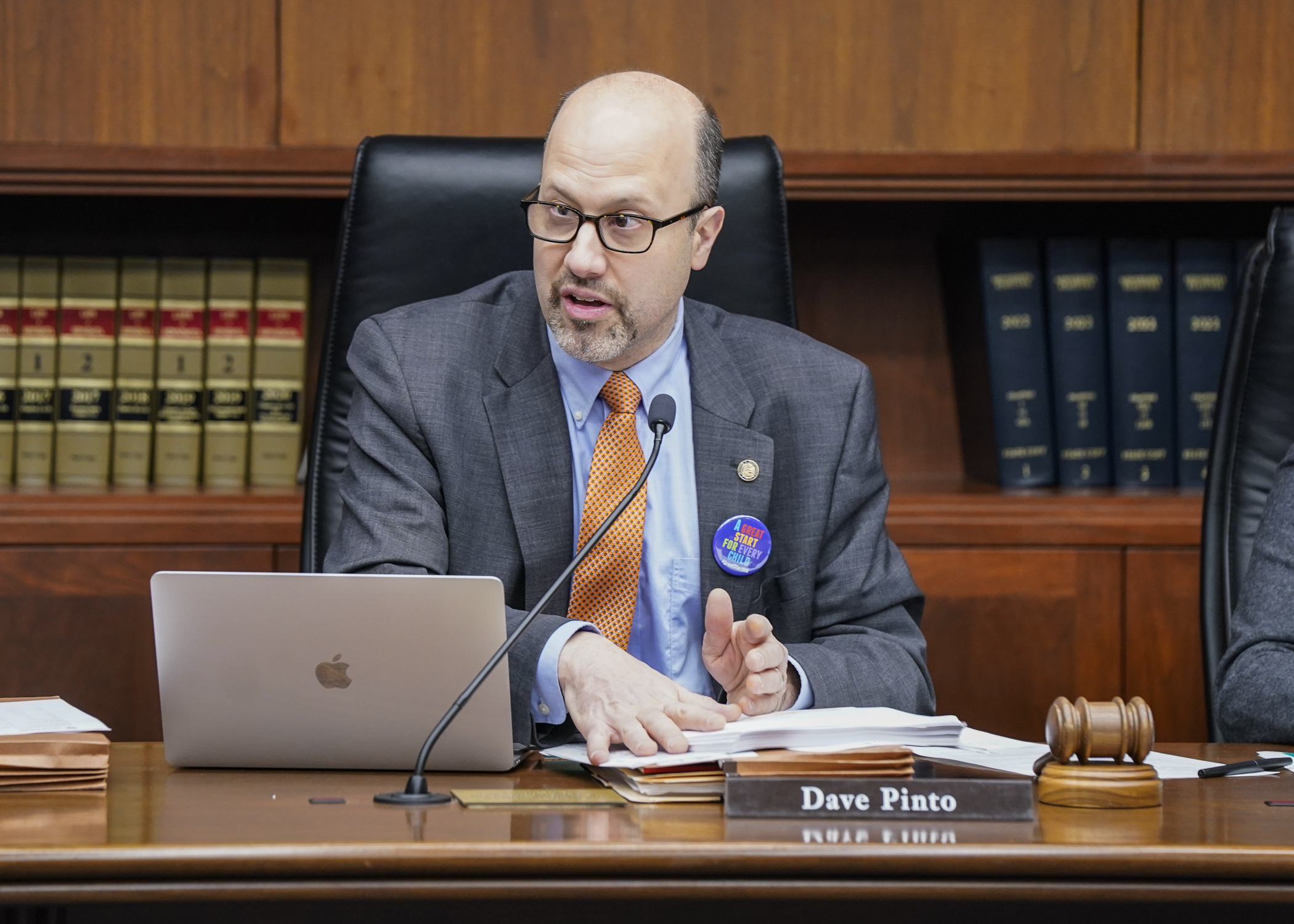Proposal would target youngest Minnesotans, families with $1 billion in funding

Major investments in child care, early learning and homelessness form the core of the omnibus children and families finance bill unveiled Tuesday.
Sponsored by Rep. Dave Pinto (DFL-St. Paul), HF238 was modified by a delete-all amendment adopted by the House Children and Families Finance and Policy Committee during a morning hearing, then members were given a walkthrough of the bill.
The budget target for children and families agreed to last week by legislative leaders and Gov. Tim Walz, calls for $1.17 billion in new General Fund spending during the upcoming biennium: $875 million in health and human services; $300 million for early education.
The bill hits those targets.
[MORE: See the HHS, early education spreadsheets]
“In a number of areas we are making transformational change in response to some really significant needs that we’ve heard in the committee,” Pinto said.
One of the largest single appropriations proposed over base budget is a $270.9 million increase in funding for the Early Learning Scholarship Program that helps low-income families with young children access programs that prepare them to attend school.
During a February hearing the committee was told the scholarships are one of the best methods to prevent opportunity gaps from opening among children.
Other substantial spending increases in the education portion of the bill include:
- $10 million for facilities grants to Head Start agencies to improve and expand services to help additional low-income children; and
- $6 million to develop, continue or expand Grow Your Own programs that work to bring more teachers to the profession.
The largest new spending appropriations in the health and human services portions of the bill include:
- $193.3 million for retention payments to providers in the Child Care Assistance Program, which helps eligible families obtain child care while parents are working or in school. It is supervised by the state, administered by counties and tribes and paid for with a combination of federal, state and local funds;
- $150.8 million for emergency shelter grants to eligible applicants to acquire property, design, build, renovate, equip and furnish emergency shelter facilities;
- $146.8 million to raise reimbursement rates for CCAP providers by raising the maximum amount participating providers can receive;
- $46.5 million for child care stabilization grants transition payments;
- $40 million for Emergency Services Program grants to address homelessness;
- $30 million for additional Basic Sliding Fee grants that help families pay for child care as they work, look for work, or go to school; and
- $27 million in additional funding for the Homeless Youth Act.
Among the bill’s other notable provisions would be the creation of a new state agency. The Department of Children, Youth, and Families would combine core child, youth and family support programs to better serve Minnesota’s children.
The Human Services, Education, Health and Public Safety departments would be required to transfer responsibilities that would fall under the jurisdiction of the new department, along with relevant staff and unexpended appropriations.
Funding for informal kinship caregivers is also included, with $2 million appropriated for kinship care support grants. Kinship care is commonly defined as the full-time care of a child by relatives, members of a tribe or clan, godparents, stepparents, or other adults who have a family relationship to the child. Nearly 80,000 children in the state are being raised informally by a relative.
A homeless youth pilot project that would provide a direct cash stipend to homeless youth in St. Louis County is also included in the bill. The project would need to be designed to meet the needs of underserved communities.
Pinto said the committee plans to meet Wednesday morning to take public testimony, then meet Thursday to consider amendments, discuss the bill and take a final vote.
***
What’s in the bill?
The following are selected bills that have been incorporated in part or in whole into the omnibus children and families finance bill:
- HF13 (Pinto)
- HF177 (Hanson)
- HF238 (Pinto)
- HF444 (Keeler)
- HF466 (Noor)
- HF862 (Wolgamott)
- HF874 (Lee)
- HF1269 (Pryor)
- HF1277 (Coulter)
- HF1521 (Hanson)
- HF1661 (Hicks)
- HF1672 (Hicks)
- HF1698 (Howard)
- HF1820 (Hanson)
- HF1858 (Keeler)
- HF2008 (Kozlowski)
- HF2029 (Coulter)
- HF2106 (Kotyza-Witthuhn)
- HF2320 (Pinto)
- HF2330 (Coulter)
- HF2471 (Pinto)
- HF2565 (Pinto)
- HF2573 (Kotyza-Witthuhn)
- HF2665 (Hicks)
- HF2900 (Pinto)
- HF2910 (Pinto)
Related Articles
Search Session Daily
Advanced Search OptionsPriority Dailies
Speaker Emerita Melissa Hortman, husband killed in attack
By HPIS Staff House Speaker Emerita Melissa Hortman (DFL-Brooklyn Park) and her husband, Mark, were fatally shot in their home early Saturday morning.
Gov. Tim Walz announced the news dur...
House Speaker Emerita Melissa Hortman (DFL-Brooklyn Park) and her husband, Mark, were fatally shot in their home early Saturday morning.
Gov. Tim Walz announced the news dur...
Lawmakers deliver budget bills to governor's desk in one-day special session
By Mike Cook About that talk of needing all 21 hours left in a legislative day to complete a special session?
House members were more than up to the challenge Monday. Beginning at 10 a.m...
About that talk of needing all 21 hours left in a legislative day to complete a special session?
House members were more than up to the challenge Monday. Beginning at 10 a.m...